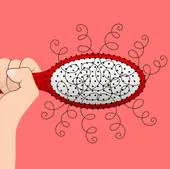An infallible technique to avoid taking work problems to bed
[ad_1]
Yes, it’s maddening. We spend a lot of hours working and, finally, when we get to bed…, nothing, we stay awake because work takes up space in our heads and prevents us from sleeping. It may also happen that we manage to fall asleep, but that in the middle of the night we wake up with some thought about work and that we cannot go back to sleep. And how absurd, stupid and guilty we feel when we are unable to enjoy our well-deserved and necessary hours of rest! Can we know why our mind boycotts us at night with work?
Diego Redolar, neuroscientist, explains it to us: «When we are working there are neural networks that are activated. There are those involved in attention, decision making, creative thinking, problem solving, reasoning… And what happens when we go to sleep? That some are activated to solve problems and many times arrive at quite creative solutions. That is, our head, on its own, tries to resolve pending things.
The problem, Redolar points out, is that this is detrimental to the hours we sleep and the quality of sleep, of course. Furthermore, we do not always find ‘magic’ solutions, sometimes what ‘attack’ us at night are short, repetitive thoughts that lead nowhere and are motivated by stress. «And what they do is wake you up at certain times of the night that coincide with certain phases of sleep. They lead to nothing; in fact, they ‘usurp’ the neural networks necessary for creative thinking.” That is to say, the noise that comes from being overloaded with work is unproductive.
An inadequate workload, high-pressure supervision, poor relationships between colleagues, workplace harassment, incorrect management of work time or digital hyperconnection are situations that generate fatigue and stress and that can interfere with employees’ night’s rest. workers. This is stated by Iván Fernández Suárez, professor of the Master in Occupational Risk Prevention at the International University of La Rioja (UNIR), who clarifies that the sleeplessness, to a large extent, is due to the fact that our demands have multiplied. «We accumulate too many ‘we have to…’ and they are not only work things that we must do, there are also duties that we add, such as attending to social networks, for example, where on top of that we ‘see’ that everyone does a lot of things exciting in their daily lives… and that of course are a lie.
Then, it’s time to sleep and what happens? “It is impossible for the mind to stop dead,” because it has been hyperactivated all day and that tiredness is not ‘healthy’, it is not the kind that leads us to a restful sleep. Quite the opposite. Thus, Fernández advises taking our head to another place before trying to sleep. That is, when the work day ends, we must look for an activity that we like and that requires some concentration (because thinking continues working, remember) to make our brain change the chip and don’t boycott us at night. Run? Read? Everyone has their own formula, but it is better that they are activities where we can’t get lost (running or reading can easily make our minds wander to the problem). «It helps me to play football, because I’m not good at it and I have to focus. For others, painting or drawing… Come on, something that requires our attention.
But what do we do if, despite having tried to distract our brain with something other than work, we get to bed and work comes with us? “It is not easy to control it, but there are techniques that work,” says Ainhoa Álvarez, coordinator of the Insomnia working group of the Spanish Sleep Society. Here are the three most effective, according to the expert. Shall we try them?
«It consists of identifying the thought that is keeping us awake, stopping it and thinking about something else. It has to be something very mechanical and we must train a lot during the day so that it works automatically for us later,” he points out.
The brain is very tough and sometimes you have to play the same cards. «With this method it is about doing the opposite… Do we want to sleep and our head says ‘no’? Well, let’s try not to fall asleep. And what happens? “It’s enough for you to make an effort at something for the brain to do the opposite and we fall flat,” she explains. It’s like when a word doesn’t come out and we get overwhelmed… We will remember only when we stop obsessing about finding it. The same thing happens with sleep.
«If we know that a work issue is keeping us up at night, we are going to analyze it during the day, because at night we see everything with much more catastrophism – he recommends –. During the day we give it the real weight, what it has. So we are going to try to solve the problems of working during the day and separate them from those hours of the night where everything seems much worse.
[ad_2]
Source link





